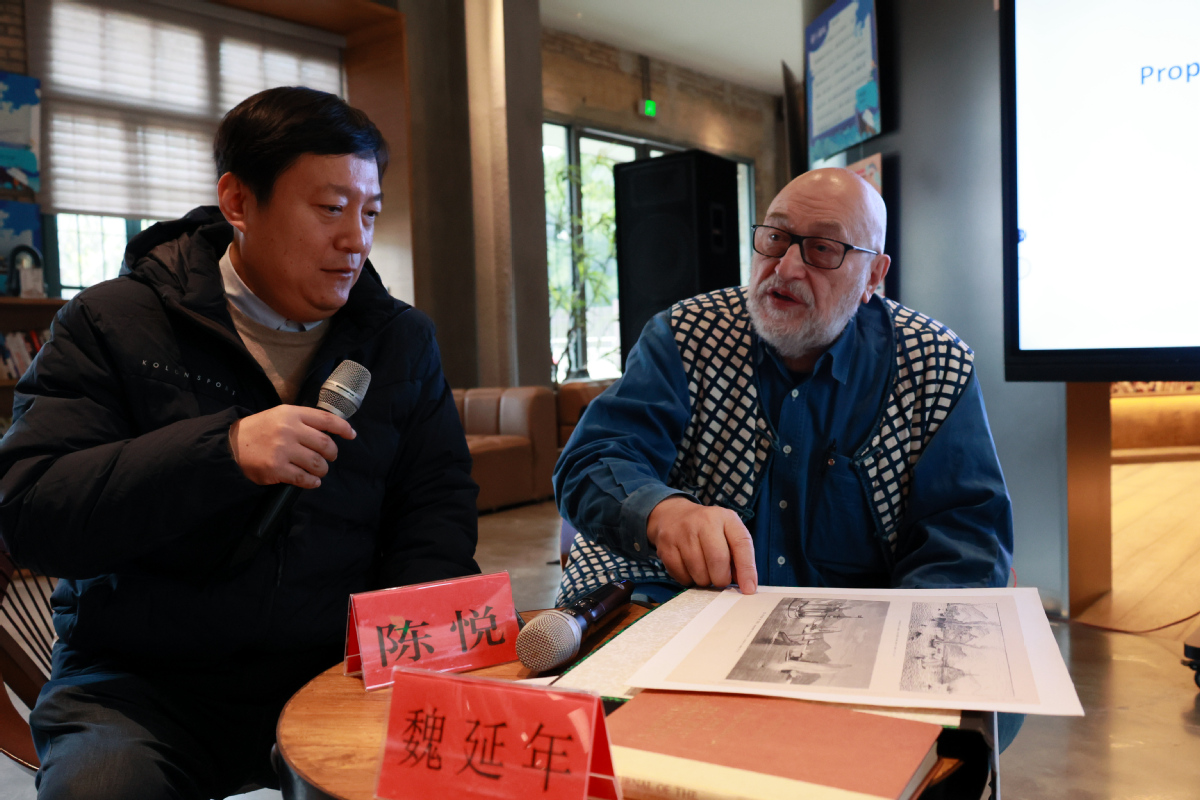French scholar and his life's work studying Chinese shipbuilding culture
 René Viénet shows old photos of the bureau at a bookstore in Fuzhou, capital of Fujian province on Dec 23, 2023, at an event marking the 157th anniversary of the founding of the Fuzhou Shipping Bureau. [Photo provided to chinadaily.com.cn]
René Viénet shows old photos of the bureau at a bookstore in Fuzhou, capital of Fujian province on Dec 23, 2023, at an event marking the 157th anniversary of the founding of the Fuzhou Shipping Bureau. [Photo provided to chinadaily.com.cn]
René Viénet, aged 80, over the past three decades, has dedicated himself to studying and promoting what Chinese historians call the "Chuanzheng culture", also known as shipbuilding culture.
Viénet, a French scholar of modern Chinese history, has studied the fascinating history of the Fuzhou Shipping Bureau and Fuzhou Shipping School established in the year 1866. It's worth noting that Prosper Giquel, a French naval officer, played his part in the building and growing the shipyard and the school.
Viénet said he considers Giquel as a model for cooperation between China and France and admires his role in China's modernization and established French language teaching in China.
"Chinese and French people alike should be proud of Giquel's dedication and achievements, a model of what can and should be developed," he said.
"I have been collecting historical materials on Giquel since 1983 and I am grateful for Giquel's heir Arnaud de Panafieu opening their rich Giquel family archives," he added.
This year marks the 60th anniversary of establishing diplomatic ties between China and France. Viénet said he and Arnaud de Panafieu have been invited to give lectures at the Lyon public library, and at Ecole Polytechnique Alumni Hall, to display on screen historical documents and photos related to Giquel.
"This will allow our fellow French to better understand Chinese history and Giquel's eminent role in China's modernization," he said.
Giquel (1835-1886) came to China in 1857. Viénet said Giquel once asked for leave from the French Navy to learn the Chinese language. In 1866, Giquel was assigned by Zuo Zongtang (1812-1885), an official of the Qing Dynasty (1644-1911), as director of the Fuzhou Shipping Bureau and the Fuzhou Shipping School to be built at today's Mawei District, in Fuzhou, capital of Fujian province.
According to Viénet, about 50 French engineers and teachers joined Giquel for almost ten years.
In Viénet's view, Giquel, fluent in Chinese, loved China and devoted his heart and soul to the bureau and the school with tremendous success.
Dozens of young kids of Fujian province became fluent French speakers, and mastered European technologies, he said.
The shipyard was the most modern in Asia and by the end of the year 1873, 15 modern ships, with propellers and steam engines, had been built by 2,500 Chinese workers trained to use European machinery, according to Viénet.
"This was an incredible performance of swift and effective technology transfer. And for sure the very first one in modern China," he said.
Viénet said Giquel, together with his friend Lemaire, drafted and published the first French-Chinese dictionary with a focus on technical shipbuilding vocabulary, and he arranged his students in the school to pursue studies in France and the United Kingdom in 1875.
In memory of Giquel as a pioneer of China-France friendship, the French Minister of Foreign Affairs, in 2014, presented to the Museum of Foochow Arsenal a replica of the Giquel statue that has been cast in bronze to be donated to his family after the funeral in 1886. Foochow is Fuzhou in the local dialect.
In 2006, for the 140th anniversary of the founding of the Fuzhou Shipping Bureau, Viénet, along with his friend, Du Liyan, brought rare and precious photos that were then unknown in China, to Lin Yingyao, an official with Fujian Mawei Shipbuilding Company Limited, whose predecessor was the bureau.
Viénet said Lin received them with gratitude and swiftly exhibited those historical photos in one of the surviving magnificent red-brick buildings erected by Giquel. Lin highly praised photos, saying they depicted precisely the technology of the time.
Viénet was later invited to deliver several lectures in Fuzhou.
"Stimulated by my warm exchanges with friends in Mawei, I reached out to the heirs of Giquel in France, particularly Arnaud de Panafieu, who made available their family archives, a fantastic trove of historical documents," he said.
Viénet, in 2016, for the 150th anniversary of the bureau, was again invited to Mawei, where he delivered a large collection of rare images, engravings, books and photos from the Giquel family and his collections.
By 2026, which will be the 160th anniversary, Viénet together with his friend Arnaud de Panafieu, will cooperate with France National Marine Museum to organize an exhibition in Lorient Harbour, where Giquel was born.
Vienet expressed the hope more French could travel to Fujian to visit the museum to understand the history and boost friendship between the two countries.
"I am very happy to see that Fujian province is sparing no effort to explore the cultural resources, actively protect and make good use of historical sites," he said.
China's first folding progressive multidimensional experience play "The Glory Belongs to Fuzhou Arsenal" was officially performed in Mawei in December to revisit the spirit of shipbuilding.
Viénet also mentioned a possible documentary film, displaying the historical photos and relics, in regard to the huge development of the Chuanzheng Culture Theme Park around the Museum of Foochow Arsenal.




